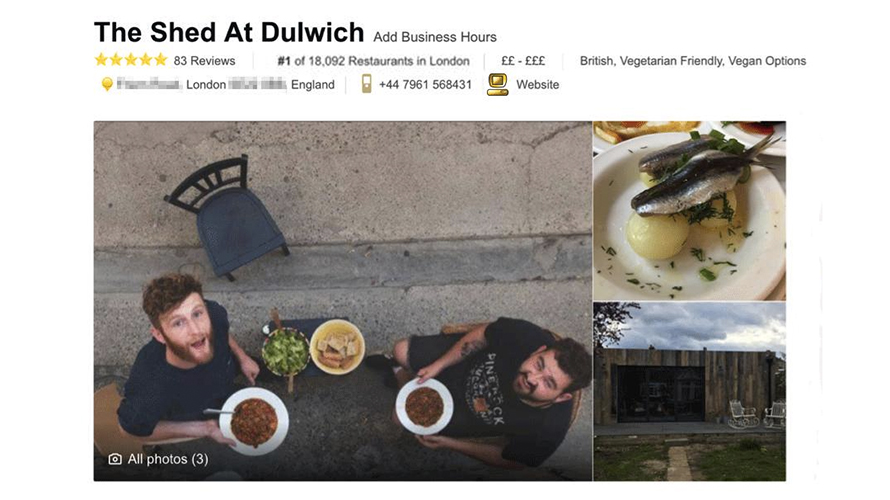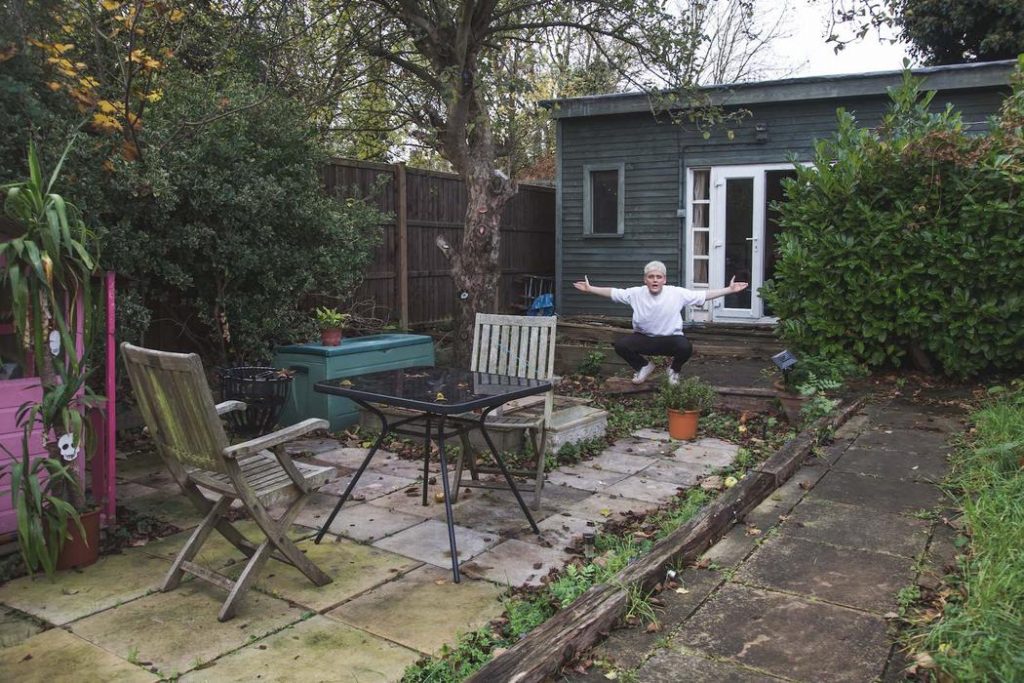Freelancer Oobah Butler believes online reviews are far from reliable. And he should know, given that by his own admission he used to get paid by restaurants to write fake praise on TripAdvisor.
So, this year he decided to see how far falsehood could go. And the answer, perhaps no surprise in our current political climate, is that bold lies can take you right to the top.
Using a burner phone and an intentionally vague address, Butler created an “appointment only” restaurant on TripAdvisor called “The Shed at Dulwich.” He then had friends and collaborators speckle the site with fictional reviews, glowing about the “earthy taste and freshness of the food.”

Like all good and ludicrously unsustainable lies, this one expanded exponentially, until he was ignoring hundreds of phone calls and emails, telling the few people who got through that the place was booked up indefinitely. But then he decided to open the doors for one night only. And things, of course, got even weirder.
Butler has recapped his entire experience in a lengthy and gloriously ridiculous Vice article headlined “I Made My Shed the Top Rated Restaurant On TripAdvisor.” In a world where people love to crow about “fake news,” Butler’s piece is the rare exception where falsehood transcends simple deception and becomes applause-worthy in its audacity.
As an amuse-bouche, here are a few choice moments from the restaurant’s big (and only) night:
“I lead the four, hand in hand, into the garden. As we approach the house, Maria says, ‘I can hear the sound of a kitchen!’ No, Maria, you cannot. The blindfolds come off. The Americans are silent.”
“As there is no incentive for anyone in the real world to create a fake restaurant, it is not a problem we experience with our regular community. Therefore, this ‘test’ is not a real-world example.” – TripAdvisor representative
“I place the pair’s dishes down, move away and, observing from a distance, watch them stare at their Mac n Cheese. Maria takes out her phone for a photo, looks at the meal through her camera, pauses, then puts her phone away without taking a picture.”
Since The Shed’s very few real-world patrons weren’t charged anything for their meals, it’s a relatively victimless crime. But of course there is one notable victim: TripAdvisor, whose reputation surely isn’t improved by having its top-rated restaurant in a major city be completely fictional. (It removed the listing before Butler’s tell-all article went live.)
TripAdvisor’s official response, which one can picture being said with narrowed eyes and a clenched jaw, is that Butler’s stunt is very much an exception rather than a sign of widespread deception:
“Generally, the only people who create fake restaurant listings are journalists in misguided attempts to test us,” a TripAdvisor rep said in a statement emailed to Butler. “As there is no incentive for anyone in the real world to create a fake restaurant, it is not a problem we experience with our regular community. Therefore, this ‘test’ is not a real-world example.”

UPDATE: TripAdvisor reached out to Adweek with a lengthier statement, including details on how it had flagged and “applied a penalty to the property” before Butler revealed his stunt:
It is important to note that generally, the only people who create fake restaurant listings are journalists in misguided attempts to test us. As there is no incentive for anyone in the real world to create a fake restaurant it is not a problem we experience with our regular community—therefore this ‘test’ is not a real-world example.
Most fraudsters are only interested in trying to manipulate the rankings of real businesses – so naturally that is what our content specialists are focused on catching. We use state-of-the-art technology to identify suspicious review patterns, based on modelling of what normal review behavior looks like. This is why the distinction between attempted fraud by a real business, as opposed to attempted fraud for a non-existent business, is important. Real businesses, whether they try to game our system or not, have a footfall of genuine customers coming through the door and those customers contribute to the review patterns we would expect to see. Spotting the difference between a business’ genuine customer reviews and its fake reviews is one of the ways we catch fraud. If a business does not exist at all, then clearly those patterns are going to differ from normal models of activity.

Our community too can report suspicious activity to us. Again, this is much more likely to occur in real business cases, where genuine customers walk through the door. Between our teams, our tools and our community, we believe we have effective checks and balances in place to maintain the integrity of the reviews on TripAdvisor.
According to a 2015 PhoCusWright study commissioned by TripAdvisor, 93% of TripAdvisor users said they find the reviews they read to be accurate of the actual experience. No organization, business or person in the world has more incentive than TripAdvisor to ensure the reliability of the content on our site. The bottom line is, if people didn’t find the reviews helpful, they wouldn’t keep coming back to our site. The fact that hundreds of millions of consumers continue to do so is testament to the reliability of our review model.
It is also worth noting that suspicious review activity on this listing page had been on our radar for some time. In fact, we had already applied a penalty to the property which reduced its position within our Popularity Ranking and removed a number of its reviews, prior to the listing itself being identified as fraudulent and removed from the site. From the moment our system identified a suspicious pattern of reviews, it was only a matter of time before we caught and shut down this listing.
Source: Adweek




